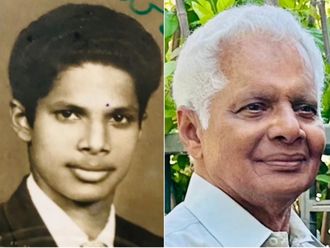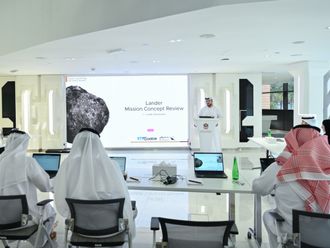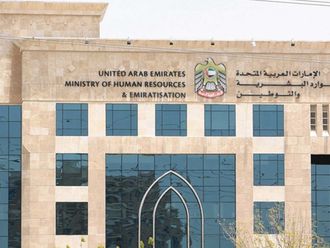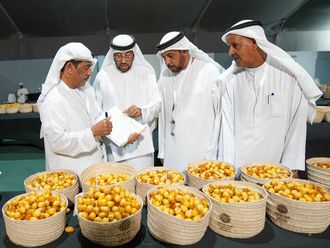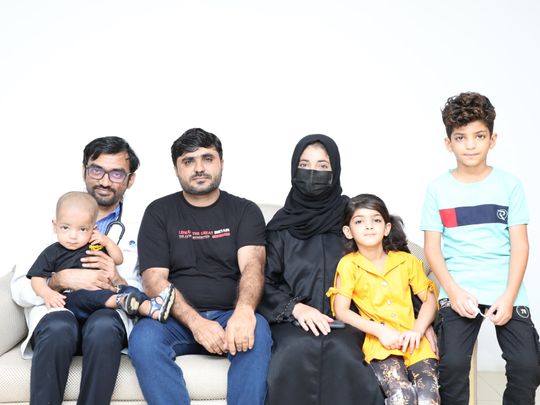
Dubai: A Pakistani expat has thanked a hospital in India and two UAE charities for saving the life of his two-year-old son who had been proclaimed ‘dying’.
The family of Jalal Khan, a driver with a Ras Al Khaimah company, has been staying in the south Indian state of Kerala for over five months for the high-risk bone marrow transplant of his son Saif Jalal, who was diagnosed with a rare and extremely severe genetic disease called Severe Combined Immunodeficiency (SCID).
Speaking to Gulf News from Kerala, Khan said his son’s life was saved “with the blessings of Allah”, the expertise of the doctors at Aster MIMS (Malabar Institute of Medical Sciences) Hospital Calicut, and the financial support of Emirates Red Crescent - Northern Emirates, and Sharjah Charity International.
He also thanked the Indian Consulate in Dubai, which expedited issuing the medical visa for Saif under the direction of Dr Aman Puri, the Consul General of India in Dubai, and Aster DM Foundation and Aster Volunteers who supported the family with measures to secure the medical help and other assistance in India.
What is SCID?
The doctor who led the treatment and bone marrow transplant of Saif is Dr Kesavan M.R., consultant, Paediatric Hemato Oncology and Bone Marrow Transplant at Aster MIMS Calicut.
Most of these children die by the age of two or three unless a successful bone marrow transplant is done. In many cases, say 40 per cent, children die during the transplant also and the survival rate is very low.
The doctor explained to Gulf News that children with SCID present failure to thrive like normal children and will require multiple hospitalisations with recurring infections soon after birth.
“They report infections with opportunistic organisms, and infections in unusual sites,” he said.
Opportunistic pathogens usually do not harm the host but can cause diseases when the host’s immunity or resistance is low.
SCID infants appear healthy at birth but are extremely vulnerable to severe illnesses.
The condition is fatal, usually within the first year or two of life, unless infants receive immune-restoring treatments, such as transplants of blood-forming stem cells, gene therapy, or enzyme therapy.
More than 80 percent of SCID infants do not have a family history of the condition.
Development of a newborn screening test has made it possible to detect SCID before symptoms appear, helping ensure that affected infants receive life-saving treatments.
[Source: US National Institutes of Health]
“Most of these children die by the age of two or three unless a successful bone marrow transplant is done. In many cases, say 40 per cent, children die during the transplant also and the survival rate is very low,” added the doctor, who is also a consultant in paediatrics, neonatology and multi-organ transplant.
What happened to Saif?
Khan said Saif was a premature baby and had required 21 days of hospitalisation when he was born. “Everything was normal then. Nobody could find out his immunity deficiency.”
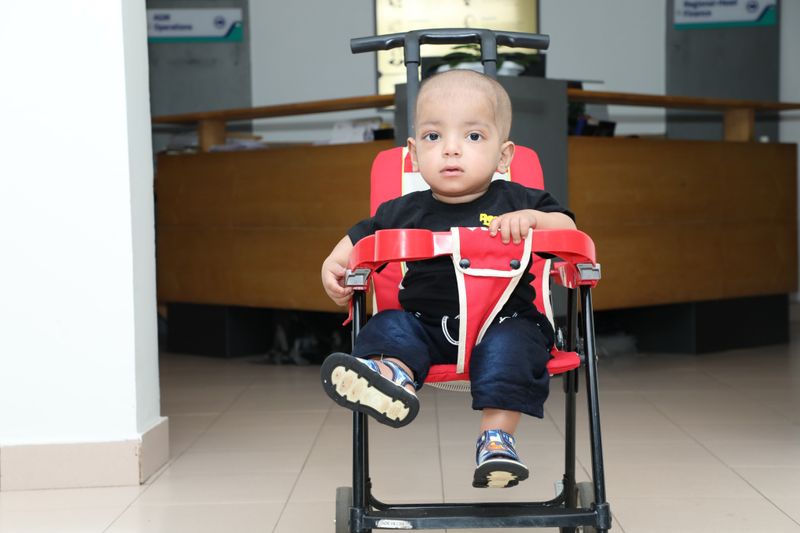
After three months, Saif started having chest infections. “He had wheezing and we could hear loud sound from his chest,” Khan said.
Saif developed recurrent pneumonia, diarrhoea and other infections. Though they visited different hospitals, Khan said Saif could not recover. Saif’s immune system had completely collapsed, and he was plagued by constant infections by the time he turned eight or nine months.
Gradually, the infection in the lungs worsened and his oxygen saturation level kept dropping. He then became completely dependent on high flow nasal cannula for oxygen supply and was fed through tube.
“The dysregulated immune disorder also caused virus-driven malignancy [cancer],” explained Dr Kesavan.
Saif was then transferred from Saqr Hospital in Ras Al Khaimah to Al Tawam Hospital in Al Ain where he underwent chemotherapy.
“The doctors there treated his cancer but they told me the only way to save my son was a bone marrow transplant. They advised me to go ahead with the transplant even if there was at least 5 per cent chance of survival,” recollected Khan.
They first went home to Balochistan in Pakistan. “We couldn’t get the treatment there. Our options abroad were also limited and finally we decided to go to India.”
He added that they received the best quotation from Aster MIMS Calicut and the two charity organisations agreed to foot the bills.
Treatment in Kerala
The Aster UAE team then flew Saif to Kerala with the escort of a medical team from Bluedot Air Ambulance on July 15.
“Saif was lucky that his mother [Sadoori] was a full match for bone marrow transplant and I really appreciate the parents for taking the brave decision to go ahead with the transplant,” said Dr Kesavan.
However, his team had many challenges in carrying out the transplant surgery as Saif’s was a complicated case with the existing lung injuries, recurring infections and concurrent malignancy.
They treated him with various medications for two months to ensure that he was fit for the transplant.
“It was also challenging to deal with the post-transplant complications in the PICU (Paediatric Intensive Care Unit) which are unique and different from other PICU patients,” Dr Kesavan said, appreciating the expertise of his colleagues from the PICU.
The bone marrow transplant was successfully performed on September 21.
The doctors decided to monitor Saif for at least 100 days to ensure he doesn’t develop any post-transplant complications. Since his condition was stable, he was discharged from the hospital after 45 days. However, Saif was still required to be around for the period stipulated by the doctors during which he would continue to receive his food from the hospital.
Khan and his family then started living in a nearby area. “I would go to the hospital and pick up the food for him. We go for periodic checkups also,” he said.
My son has gone through a lot. We are happy to see an end to his sufferings. He is like any other normal child now. We don’t have words to thank everyone who helped us. Dr Kesavan is a God-send angel for us. He treats Saif with a lot of care. He has been there for Saif even in the wee hours sometimes.
‘Rebirth’ of son
Sadoori feels grateful for giving a ‘rebirth’ to her son by donating her bone marrow.
“My son has gone through a lot. We are happy to see an end to his sufferings. He is like any other normal child now. We don’t have words to thank everyone who helped us. Dr Kesavan is a God-send angel for us. He treats Saif with a lot of care. He has been there for Saif even in the wee hours sometimes,” she added.
The family, including four siblings of Saif, is now looking forward to coming back to the UAE and starting a new life with a healthy Saif once he is allowed to fly back.


